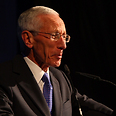
The unusual decision was made in the middle of the month in response to sharp interest rate reductions around the world due to the European debt crisis.
The Bank of Israel explained in a statement that the decision was made "in light of the continued appreciation of the shekel, taking into account the start of natural gas production from the Tamar gas field, interest rate reductions by many central banks – notably the ECB, the quantitative easing in major economies worldwide and the downward revision in global growth forecasts."
The central bank's Monetary Committee usually delivers its interest rate decision on the last Monday of each month. This year, the bank decided to reduce its monthly announcements from 12 to 10, explaining that the data flow speed in the summer months does not justify a monthly decision.
After failing to make a decision on the interest rate in April, the Monetary Committee now realized that too much time had passed since the last interest rate decision and decided to intervene in the middle of May.
The bank further announced on Monday that beginning this year, and in coming years, it would purchase foreign exchange in order to offset the effect of natural gas production on the exchange rate.
The bank said it would buy some $2.1 billion by the end of the year, and will then reexamine the issue once a sovereign wealth fund is established to manage the State's income from natural gas royalties.
Analysts' comments
"It seems as if the Bank of Israel wants to achieve the effect of a surprise to maximize the influence on the currency market," said Ori Greenfeld, head of macroeconomic research at the Psagot brokerage.
Israel's economy is expected to grow 2.8% in 2013 excluding gas production, down from 3.2% in 2012.
"The clear signs of a slowdown in economic activity forced the central bank to act immediately to encourage economic growth in spite of the threat that cheap money will ignite a dangerous real estate bubble in front of our eyes," said Yaniv Pagot, chief strategist at the Ayalon Group.
Economists suggested that further rate reductions are possible following the 2013-2014 state budget proposal that raises income and sales taxes and cuts child allowances.
"If the slowdown gathers momentum the bank will need to continue to lower interest rates," Pagot said.
The Tamar offshore natural gas field began production at the end of March and contributed to an appreciation of the shekel as a result of dollar flows.
In 2013, the improvement in the current account is estimated to be about $2.8 billion.
Against a basket of currencies, the shekel has appreciated by about 5.4% in the past three months. Its strength against the dollar and the euro in the past few months "stood out markedly in comparison with other currencies' movements vis-à-vis the dollar and euro", the central bank said.
"The interest rate reduction will hurt the attractiveness of the bet made by local and foreign investors that led to the shekel's appreciation," said Joseph Fraiman, chief executive at Prico Risk Management and Investments.
The central bank bought $100 million of foreign currency on April 8 for its first intervention since July 2011 and has bought small amounts so far in May to no avail.
Reuters contirbuted to this report















